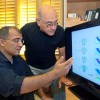
A new study in the Journal of Neuroimaging provides insights into the biochemical mechanisms by which Tai Chi, a mind–body exercise, may provide both physical and psychological benefits. Using magnetic resonance spectroscopy, tests conducted in six older adults enrolled in a twelve-week Tai Chi programme revealed significant increases in a marker of neuronal health in the brain and significantly improved recovery rates of a metabolite involved in energy production in leg muscles. Brain, 1H, and muscle, 31P, were scanned before and after the training, and post-processed to measure N‐acetylaspartate to creatine (NAA/Cr) ratios and phosphocreatine (PCr) recovery time.
“The benefits of Tai Chi have been well known anecdotally; however, recent research such as our study can quantify these improvements using objective measures”, said senior author Dr Alexander Lin, of Brigham and Women’s Hospital and Harvard Medical School, USA.
The work can be found at https://doi.org/10.1111/jon.12515.





